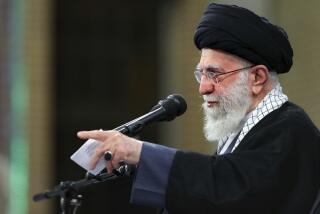Leaders of Uprising Call for Revenge on Israelis : Latest Leaflet Urges Attacks on Soldiers, Settlers ‘to Make the Enemy Pay’
- Share via
JERUSALEM — A day after Palestinians clashed with pursuing Israeli troops in a deadly shoot-out, the leadership of the Arab uprising in the West Bank and Gaza Strip called on its followers Saturday to take revenge on Israeli soldiers and settlers whenever Palestinians are killed by either.
“From a position of self-defense and in order to make the enemy pay a high price for his crimes, we call on the strike forces to attack soldiers and settlers and to kill a soldier or settler for every martyr who falls,” the latest leaflet of the underground leaders said Saturday.
Palestinian activists say that the leaflet, one of the directives periodically published by the Unified National Command of the Uprising, was in the works before Friday, when a gun-and-grenade battle left three Palestinians and one Israeli soldier dead. It was the first time in the 17-month-long uprising that Palestinians had used firearms against Israeli soldiers.
The document responds not to that incident, activists said, but is meant to combat recent measures taken by Israel to put down the intifada, as the uprising is called.
“The shoot-out (Friday) was not a turning point but a display of what might happen,” said Madi Abdel Hadi, a Palestinian political analyst.
“Looks like things are going to heat up,” added Daoud Kutab, a prominent Palestinian spokesman.
The leaflet calls for no particular weapons to be brought into play. During the 17 months of the intifada, anti-Israeli militants and demonstrators have generally limited themselves to using stones and gasoline bombs. Recently, however, Arabs suspected of collaborating with the Israelis have been killed with guns.
Reflects Impatience
Palestinian observers viewed the leaflet as reflecting impatience with diplomacy and as a response to pressure from grass-roots organizers and activists who are taking the brunt of Israeli suppression. In any case, an eye-for-an-eye call for Israeli deaths had not been made before; it remains to be seen whether the forces in the field are willing to risk an escalation against the heavily armed Israelis.
“We are at a crossroads,” said Abdel Hadi. “Either the intifada will continue at the level of the past, giving time for diplomacy to develop, or else there will be escalation--and we will have a Belfast.”
Diplomacy, being shepherded by the Bush Administration, is following a slow pace. The Administration is trying to interest the Palestine Liberation Organization as well as Palestinians in the West Bank and Gaza in taking up an Israeli offer to hold elections in the occupied land.
But both the PLO and its followers in the occupied regions want assurances that subsequent talks would lead to independence. Instead, Israel offers five years of limited self-rule and talks later on final arrangements.
Recently, Israel has put in place new military tactics designed to assert control over the Arabs in the West Bank and Gaza. For the past few months, the army and paramilitary Border Police carried out surprise raids on villages, made mass arrests, damaged property and on occasion engaged in clashes with stone-throwing residents that often ended in Arab fatalities.
Large cities were periodically placed under curfew while troops went on similar roundups.
Nonetheless, Defense Minister Yitzhak Rabin and army Chief of Staff Dan Shomron have come under fire for failing to quell the intifada and have taken further steps. Last week, the entire Gaza Strip was placed under curfew and its 600,000 inhabitants were confined to their homes. Sporadic clashes during the past two weeks have left 10 Arabs dead in the Gaza Strip alone.
Settlers, meanwhile, have set up vigilante groups to retaliate for stone throwing. The settlers mainly vandalize Palestinian property, but there have been instances of Arab deaths at the hands of the vigilantes.
The run of casualties and arrests have angered grass-roots militants who feel that their hands are tied by the limited tactics of the intifada. Graffiti have appeared on walls of several towns calling for “armed resistance,” and factions of the Palestinian resistance groups have issued their own leaflets calling for greater violence.
One grouping, called the Abu Jihad Brigades, began to lobby for escalation as early as February.
More to Read
Sign up for Essential California
The most important California stories and recommendations in your inbox every morning.
You may occasionally receive promotional content from the Los Angeles Times.













